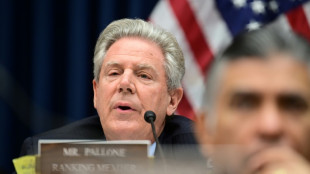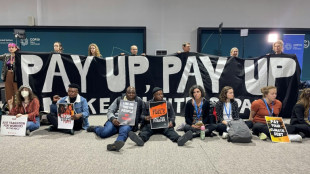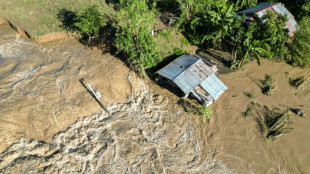
-
 Son of Norwegian princess arrested on suspicion of rape
Son of Norwegian princess arrested on suspicion of rape
-
Romanian court says 'irregularities' in influencer Andrew Tate's indictment

-
 Iran faces fresh censure over lack of cooperation at UN nuclear meeting
Iran faces fresh censure over lack of cooperation at UN nuclear meeting
-
Despondency and defiance as 45 Hong Kong campaigners jailed

-
 Scholar, lawmakers and journalist among Hong Kongers jailed
Scholar, lawmakers and journalist among Hong Kongers jailed
-
European stocks slide on fears of Russia-Ukraine escalation

-
 Police break up Georgia vote protest as president mounts court challenge
Police break up Georgia vote protest as president mounts court challenge
-
Spain royals visit flood epicentre after chaotic trip

-
 France's Gisele Pelicot says 'macho' society must change attitude on rape
France's Gisele Pelicot says 'macho' society must change attitude on rape
-
G20 leaders talk climate, wars -- and brace for Trump's return

-
 US lawmaker accuses Azerbaijan in near 'assault' at COP29
US lawmaker accuses Azerbaijan in near 'assault' at COP29
-
Tuchel's England have 'tools' to win World Cup, says Carsley

-
 Federer hails 'historic' Nadal ahead of imminent retirement
Federer hails 'historic' Nadal ahead of imminent retirement
-
Ukraine vows no surrender, Kremlin issues nuke threat on 1,000th day of war

-
 Novo Nordisk's obesity drug Wegovy goes on sale in China
Novo Nordisk's obesity drug Wegovy goes on sale in China
-
Spain royals to visit flood epicentre after chaotic trip: media

-
 French farmers step up protests against EU-Mercosur deal
French farmers step up protests against EU-Mercosur deal
-
Rose says Europe Ryder Cup stars play 'for the badge' not money

-
 Negotiators seek to break COP29 impasse after G20 'marching orders'
Negotiators seek to break COP29 impasse after G20 'marching orders'
-
Burst dike leaves Filipino farmers under water

-
 Markets rally after US bounce as Nvidia comes into focus
Markets rally after US bounce as Nvidia comes into focus
-
Crisis-hit Thyssenkrupp books another hefty annual loss

-
 US envoy in Lebanon for talks on halting Israel-Hezbollah war
US envoy in Lebanon for talks on halting Israel-Hezbollah war
-
India to send 5,000 extra troops to quell Manipur unrest

-
 Sex, drugs and gritty reality on Prague's underworld tours
Sex, drugs and gritty reality on Prague's underworld tours
-
Farmers descend on London to overturn inheritance tax change

-
 Clippers upset Warriors, Lillard saves Bucks
Clippers upset Warriors, Lillard saves Bucks
-
Acquitted 'Hong Kong 47' defendant sees freedom as responsibility

-
 Floods strike thousands of houses in northern Philippines
Floods strike thousands of houses in northern Philippines
-
Illegal farm fires fuel Indian capital's smog misery

-
 SpaceX set for Starship's next flight, Trump expected to attend
SpaceX set for Starship's next flight, Trump expected to attend
-
Texans cruise as Cowboys crisis deepens

-
 Do the Donald! Trump dance takes US sport by storm
Do the Donald! Trump dance takes US sport by storm
-
Home hero Cameron Smith desperate for first win of 2024 at Australian PGA

-
 Team Trump assails Biden decision on missiles for Ukraine
Team Trump assails Biden decision on missiles for Ukraine
-
Hong Kong court jails 45 democracy campaigners on subversion charges

-
 Several children injured in car crash at central China school
Several children injured in car crash at central China school
-
Urban mosquito sparks malaria surge in East Africa

-
 Djibouti experiments with GM mosquito against malaria
Djibouti experiments with GM mosquito against malaria
-
Pulisic at the double as USA cruise past Jamaica

-
 Many children injured after car crashes at central China school: state media
Many children injured after car crashes at central China school: state media
-
Asian markets rally after US bounce as Nvidia comes into focus

-
 Tens of thousands march in New Zealand Maori rights protest
Tens of thousands march in New Zealand Maori rights protest
-
Five takeaways from the G20 summit in Rio

-
 China, Russia ministers discuss Korea tensions at G20: state media
China, Russia ministers discuss Korea tensions at G20: state media
-
Kohli form, opening woes dog India ahead of Australia Test series

-
 Parts of Great Barrier Reef suffer highest coral mortality on record
Parts of Great Barrier Reef suffer highest coral mortality on record
-
Defiant Lebanese harvest olives in the shadow of war

-
 Russian delegations visit Pyongyang as Ukraine war deepens ties
Russian delegations visit Pyongyang as Ukraine war deepens ties
-
S.Africa offers a lesson on how not to shut down a coal plant


Canada's safe injection sites, 20 years on, face pushback
Canada, after two decades of leading on treating addiction as a health issue, is suddenly facing pushback on supervised sites for injecting narcotics that prevent overdoses but are being blamed for spikes in neighborhood crime.
The first such site in North America opened in Vancouver in 2003, followed by dozens more in the last few years as synthetic opioids hit Canadian streets.
Ontario is now closing 10 sites out of 38 nationwide, while other provinces are facing pressure to follow suit. Worldwide there are only 100.
The sites are at the center of a complex problem: they keep drug users from accidental deaths, but don't solve the larger problem of addiction -- or the myriad public safety issues that come with that, leading to growing frustration among the public.
"I do not call watching someone inject an illicit drug to be health care," Ontario Health Minister Sylvia Jones said when announcing the closures of sites near schools or daycares by March of next year.
Harm reduction advocates, however, say less supervision will lead to more deaths.
Jones justified the closures by pointing to "altercations, stabbings, shootings and even a homicide in the vicinity of these sites." She cited crime rates up to 250 percent higher in neighborhoods with safe injection sites.
The sentiment has been echoed across Canada.
Lauren Lemoine, 63, lives near Ottawa's slated-to-close Somerset West site. He was assaulted by people on drugs that, according to experts, have grown much more toxic over the years.
"They're super violent on these bloody drugs," he told AFP.
In Red Deer, Alberta, council member Vesna Higham is pressing for the closure of her city's only site.
Since it opened in 2018, she said there's been an explosion of vandalism including smashed windows, fires being set, public urination, and discarded drug paraphernalia. Storefronts have closed and visits to the downtown neighborhood plummeted.
"Residents and businesses are fed up," Higham told AFP. "They feel desperately burdened by the relentless daily crime and social disorder that plague the area."
"What we've been doing to date has not been working," she said. "It's only proliferating the problem."
"We have to now shift how we are approaching this crisis."
The province is considering legislating forced rehab.
- 44,592 dead -
Yet for those in favor of the sites, the stats are clear: from 2016 to 2023, there were 44,592 fatal overdoses in Canada. None were at safe injection sites.
Getting rid of the sites might not eliminate crime, either.
Jessica Lyons, a nurse at a Toronto site, told a press conference: "Eliminating sites will increase public drug use."
She warned communities will see "increased public disposal of drug use equipment (and) more incidences of bodies being discovered in alleyways and parks, in (public) bathrooms, and in libraries."
It will lead to the spread of diseases such as HIV and hepatitis linked to shared use of needles, she said.
Closing sites also runs counter to the direction others are going.
"More countries are starting to think of drug use as a health issue, as a social issue, and not as a criminal or moral issue," said Nicholas Boyce, of the Canadian Drug Policy Coalition, a grouping of 50 organizations that influence drug policy.
He noted that the UN Commission on Narcotic Drugs in March passed its first resolution recognizing harm reduction strategies. It was supported by 38 nations.
"Canada is looked at internationally as being one of the more progressive countries," Boyce said. "So it's really disheartening to see that there's now this serious pushback."
In another blow to Canada's reformist drug policy, British Columbia in April dialed back decriminalizing the possession of drugs such as cocaine and heroin -- in a move advocates say would reduce the stigma that kept users from seeking help -- following an outcry over soaring use in public.
In 2011, Ottawa tried to close what was then Canada's only authorized safe injection site, but the Supreme Court ruled Insite in Vancouver was "an effective response to the catastrophic spread of infectious diseases... and the high rate of deaths from drug overdoses."
Jonathan McAdam, 42, described "going through psychosis, self-mutilation, being a deadbeat dad and getting fired from all my jobs" before finally getting sober.
It took several attempts. "I tried and I failed. I tried and I failed. I tried and I failed."
He said harm reduction services are essential to keeping addicts alive until they're ready to seek help.
"Recovery can be scary, because you're forced to face your demons," he explained. "People have to do it for themselves. Otherwise they'll just fall back into old patterns."
P.A.Mendoza--AT
